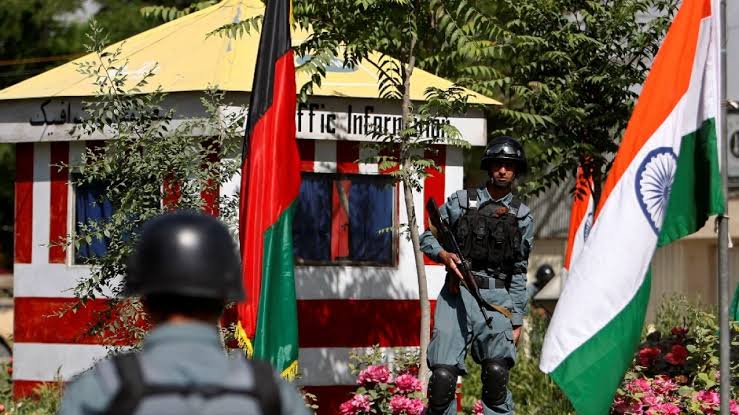The Afghan embassy in Delhi has a tricolour flag on display and a picture of former president Ashraf Ghani even after the new government in Kabul. Mr. Qadir Shah, who was formerly a trade counsellor at the Afghan Embassy in New Delhi, has been nominated to the role of Chief Envoy by the Taliban Ministry of Foreign Affairs. whereas Former Afghan President Ashraf Ghani’s nominee, Ambassador Farid Mamundzay, has voiced opposition to the appointment. Mr. Shah’s credentials as an ambassador have not yet been acknowledged by the Indian Ministry of Foreign Affairs. It is noteworthy that the Indian government has given the embassy permission to continue operating under the prior administration, matching the strategy used under the Taliban’s prior control from 1996 to 2001.
Mamundzay, who was selected by Ashraf Ghani, has made it clear that the mission would continue to adhere to the guidelines and criteria established by the previous Kabul administration, which selected him. As a sign of goodwill for guests, Mamundzay’s office has an image of former president Ashraf Ghani on display. At the Afghan embassy in Delhi, the tricolour flag and other symbols from the Ghani era are still used.
This is evidence that India has a “technical mission” in Kabul even though it does not recognise the Taliban government. Younas Qanoni and other Taliban opponents have had discussions with New Delhi. Younas Qanoni, the head of the National Resistance Front (NRF) and a former member of the Jihadi delegation, is alleged to have travelled from Turkey to India on June 15 and then held talks with Indian officials there, according to some open sources.
India’s unwillingness to recognise the ambassador chosen by the Taliban has led to scrutiny of the validity of the Indian “Technical Staff” positioned at the Indian Embassy in Kabul. This assessment emphasises the activities of India as being inconsistent and insufficient for progress in developing stronger relations with Afghanistan. There have been accusations of corruption against the Afghan embassy in New Delhi including Farid Mamundzay, a former ambassador who served under the Ghani government.
This statement demonstrates the continuing bias demonstrated by India government toward Afghanistan in that means the fostering to improve ties with Afghanistan but at the same time refusing the representative selected by the International Afghanistan Group (IAG) and reorganising the National Resistance Front (NRF) under the leadership of Younas Qanoni. When working with Afghanistan, India must maintain neutrality and adhere to values of justice.
Recent claims of corruption and mismanagement at the Afghan embassy in India have spurred an assessment of India’s mentality to Afghanistan. Vivek Dixit, an Indian businessman, asserts that he was cheated by the Afghan embassy in Delhi for INR 22,500,000 through different illicit tasks, including the illegitimate lease of diplomatic buildings and the Afghan Culture Center. Corruption claims regarding the transfer of wheat from India to the Afghan populous and the dispensing of help from the Government of India to the Afghan people represent another source of fear.
With this the diplomatic properties of Afghanistan will lose their diplomatic status, the historical/ national capital of Afghanistan will be lost due to treachery of several corrupt and treacherous officials and Indian businessmen will subsequently grab these properties.
Episode shows that while India does not recognize Taliban government but contrary to that it set up a “technical mission” in Kabul. New Delhi has been maintaining its anti-Taliban nexus with Younas Qanoni and with others who have been anathema to Taliban. Such non-recognition makes it abundantly clear that India is still standing with Ashraf Ghani’s regime and its remnants.






